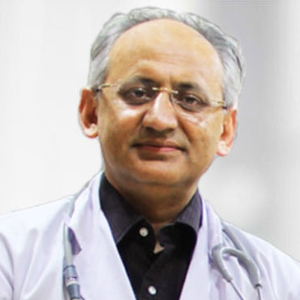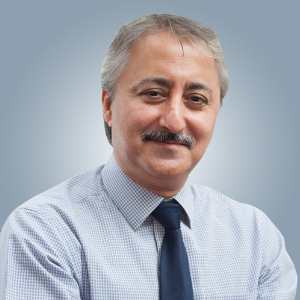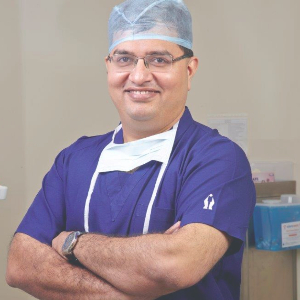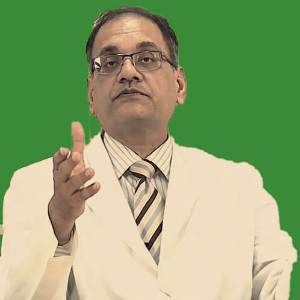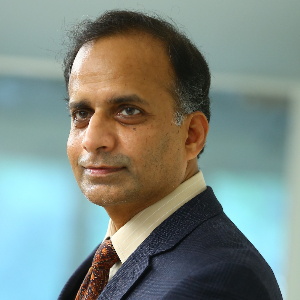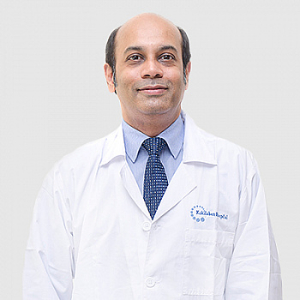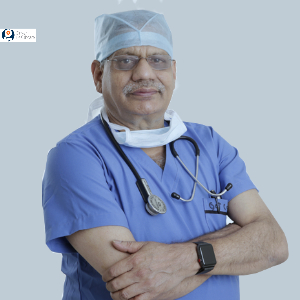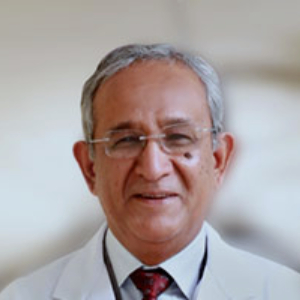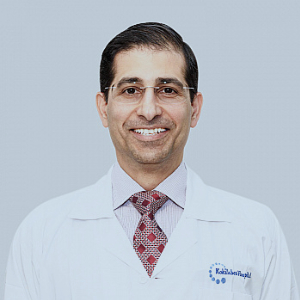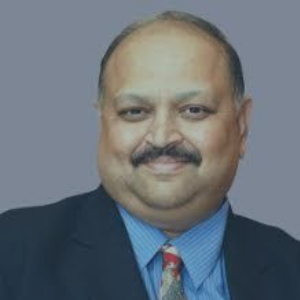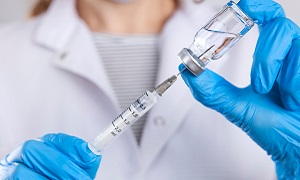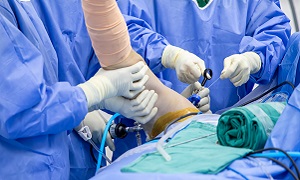Best Doctors in India for Frozen Shoulder Treatment
- Orthopedic Surgeon, Gurugram, India
- Over 25 years’ experience
Profile Highlights:
- Dr. Ravi Sauhta is a renowned Orthopedic Surgeon in India with 25+ years of experience in Joint Replacement and Reconstruction surgeries.
- He was the first surgeon in India to use minimally invasive AO techniques for trauma and also introduced reconstructive pelvic acetabular surgery and reconstructive bone tumor surgery in 1995.
- Pediatric Orthopedic Surgeon, Gurugram, India
- Over 24 years’ experience
Profile Highlights:
- Dr. Sanjay Sarup is a leading Orthopedic Surgeon with over 24 years of experience during which he has been associated with the best hospitals in the country.
- He performs a number of orthopedic procedures that includes surgery for correcting Scoliosis and Kyphosis, Club foot, dislocated hips, and hip deformity since birth among several other procedures.
- Dr. Sarup received his training in orthopedic surgery from leading hospitals in India and UK and holds a Fellowship of the Royal Hospital for Sick Children, Glasgow in Pediatric Orthopedics.
- Pediatric Orthopedic Surgeon, Gurugram, India
- Over 20 years’ experience
Profile Highlights:
- Dr. Manoj Padman is a renowned Pediatric Orthopedic surgeon in India specializing in the management and treatment of diseases and disorders of the musculoskeletal system in young children.
- Dr. Manoj Padman is considered one of the best surgeons in India for the correction of deformities and congenital defects in children. His primary interest includes birth anomalies, hip pathologies, post-infective and post-traumatic sequelae, and limb reconstruction surgeries.
- Orthopedic Surgeon & Spine Surgeon, Gurugram, India
- Over 25 years’ experience
Profile Highlights:
- Dr. Vineesh Mathur is an accomplished and renowned Orthopedic Surgeon in India specializing in Spine Surgery.
- He holds an extensive experience of 25+ years in the field of orthopedics and spinal surgery and has performed over 6000 independent surgeries till date.
- Dr. Vineesh Mathur is highly trained in all kinds of spinal procedures and received training in the procedures from distinguished institutes in India, Spain, Turkey, USA, South Korea, and Denmark
- Orthopedic surgeon, Chennai, India
- Over 35 years’ experience
Profile Highlights:
- Dr. A B Govindaraj is a leading Orthopedic surgeon who holds an extensive experience of more than 3 decades in the field and performs over 300 joint replacement surgeries annually.
- He excels in unilateral and bilateral total knee replacement, total hip replacement, and shoulder replacement surgeries.
- Pediatric Orthopedic Surgeon, Mumbai, India
- Over 15 years’ experience
Profile Highlights:
- Dr. Alaric Aroojis is a renowned Pediatric Orthopedic Surgeon in Mumbai and his expertise and primary area of specialization lie in deformity correction, cerebral palsy, and congenital anomalies. He is also an expert in performing complex pelvic osteotomy for congenital hip dislocation in young patients.
- He holds an extensive experience of more than 15 years in Pediatric Orthopedics and is highly skilled at using minimally invasive procedures for difficult limb deformity corrections.
- Orthopedic Surgeon, Hyderabad, India
- Over 30 years’ experience
Profile Highlights:
- Dr. B N Prasad is a well-known Orthopedic Surgeon with over 3 decades of experience.
- Dr. B N Prasad is among the few surgeons in the country to specialize in both adult and pediatric orthopedics and has taken up numerous cases and treated patients with excellent outcomes.
- He provides diagnostic as well as surgical treatment for various types of orthopedic disorders such as arthritis and osteoporosis.
- Orthopedic Surgeon, Gurugram, India
- Over 40 years’ experience
Profile Highlights:
- Dr. B K Singh is one of the best Orthopedic Surgeons in India with experience encompassing over 4 decades.
- He holds the credit for over 5000 Arthroplasty procedures and is one of the few surgeons in India with expertise in Robotic Knee and Hip Replacement Surgeries.
- Dr. B K Singh received his training in Joint Replacement Surgery and Robotic Knee and Hip replacement procedures from India, UK, and Japan.
- Orthopedic Surgeon, Mumbai, India
- Over 22 years’ experience
Profile Highlights:
- Dr. Dinshaw Pardiwala is an Orthopedic Surgeon par excellence specializing in shoulder replacement and sports injuries surgeries.
- With several firsts to his name, he performed the first Reverse Shoulder Replacement surgery, the first Navigation guided ACL Repair and the first Autologous Chondrocyte Stem Cell Transplant in India.
- Dr. Dinshaw Pardiwala introduced the Osteochondral Allograft Transfer and Transplant in India.
- Orthopedic Surgeon & Spine Surgeon, Mumbai, India
- Over 20 years’ experience
Profile Highlights:
- Dr. Gautam Zaveri is one of the best spine surgeons in India today and has performed over 3000 spinal surgeries for the treatment of spinal fractures, trauma, slipped discs, kyphosis, scoliosis, sciatica, spondylolisthesis, and spinal stenosis.
- Dr. Zaveri specializes in Minimally Invasive Spine Surgeries commonly known as MISS and performs most of his procedures using this technique to minimize cuts and speed up the recovery process.
Best Hospitals in India for Frozen Shoulder Treatment
Fortis Escorts Hospital, New Delhi
- City: New Delhi, India
Hospital Highlights:
- Over the last 33 years, the Fortis Escorts Heart Institute has set new standards in cardiac treatment with groundbreaking research. It is now known around the world as a centre of expertise for Cardiac Bypass Surgery, Interventional Cardiology, Non-invasive Cardiology, Paediatric Cardiology, and Paediatric Cardiac Surgery.
- The hospital has cutting-edge laboratories that perform a wide range of diagnostic tests in Nuclear Medicine, Radiology, Biochemistry, Haematology, Transfusion Medicine, and Microbiology.
- Fortis Escorts Heart Institute boasts a diverse group of bright and experienced doctors who are backed up by a team of highly qualified, experienced, and devoted support professionals as well as cutting-edge equipment such as the recently installed Dual CT Scan.
- Approximately 200 cardiac doctors and 1600 personnel currently collaborate to manage over 14,500 admissions and 7,200 emergency situations each year. The hospital now has a 310-bed infrastructure, as well as five cath labs and a slew of other world-class amenities.
Rela Hospital, Chennai
- City: Chennai, India
Hospital Highlights:
- RIMC is a multi-specialty hospital in a sprawling area of 36 acres located in Chromepet, Chennai, Tamil Nadu, India.
- The facility has 450 beds including 130 critical care beds, 9 operating rooms, modern reference laboratories and radiology services, and is conveniently located near road, rail and air transportation.
- RIMC is led and managed by world-renowned physicians committed to healthcare.
- RIMC offers the broadest range of clinical care, education, and research. The hospital offers state-of-the-art technology and modern treatment facilities designed to provide health care at an affordable cost.
- Rela Institute is driven by patient needs, comfort and confidence.
CARE Hospitals, Hyderabad
- City: Hyderabad, India
Hospital Highlights:
- CARE Hospitals were established in the year 2000, by CARE Group.
- The multispecialty hospital has 435 beds, including 120 critical care beds, with an annual inflow of 180000 outpatients and 16,000 in-patients.
- The hospital provides specialty medical services in Cardiology, Cardiothoracic Surgery, Pediatric Cardiology, Pediatric Cardiothoracic Surgery, Neurology, Neurosurgery, Nephrology, and Urology.
- The hospital has the first dual source, 128 slice CT scanner (for high precision cardiac imaging) – the first of its kind in south India.
- The hospital offers a wide range of accommodation facilities for the convenience of its varied patient base, ranging from general wards to super deluxe rooms.
Fortis Hiranandani Hospital, Mumbai
- City: Mumbai, India
Hospital Highlights:
- Fortis Hiranandani hospital was established in 2007.
- The hospital is an advanced tertiary care, multi-specialty hospital equipped with 149 beds.
- The hospital is equipped with a super ICU to provide emergency medical care to critically ill patients.
- The hospital is NABH accredited.
- The critical care facility in the hospital is augmented with the state-of-the-art facilities that facilitate speedier diagnosis and efficient monitoring.
- The hospital provides specialty medical services in cardiology, orthopedic science, pediatric science, neurology, diabetic care, urology, nephrology, ENT, obstetrics, gynecology, cosmetic surgery, bariatric surgery, neuro and spine care.
Fortis Hospital, Anandpur, Kolkata
- City: Kolkata, India
Hospital Highlights:
- Fortis Hospital, Anandapur, Kolkata is a world-class super-speciality equipped with the latest technologies in the medical world.
- The hospital is NABH accredited.
- This state-of-the-art facility specializes in cardiology and cardiac surgery, urology, nephrology, neurosciences, orthopaedics, digestive care, emergency care and critical care.
- The hospital, governed by integrated Building Management System (IBMS), has a pneumatic chute system, for quick vertical and horizontal transportation between floors, facilitating speedy transfer of patient specimens, documents, reports, and medicines to the concerned departments.
- The hospital also has a nephrology department with over 28 advanced dialysis units.
Fortis Hospital Banerghatta, Bengaluru
- City: Bengaluru, India
Hospital Highlights:
- Fortis Hospital Bannerghatta, Bengaluru was established in 2006.
- The hospital is a 276 bedded multi-specialty tertiary care facility.
- The hospital specializes in cutting-edge medical technology and dedicated patient care services.
- The hospital is equipped with state-of-the-art technologies like trans-radial angioplasty, trans-abdominal cardiac surgery, and computerized TKR navigation surgery.
- The hospital provides specialty medical services in cardiology, cardiac surgery, orthopedics, neurology, neuro-surgery, GI, and Minimal Access Surgery (MAS).
Fortis Hospital, Malar, Chennai
- City: Chennai, India
Hospital Highlights:
- Fortis Malar was established in 1992 and was formerly known as Malar Hospital.
- The hospital specializes in cutting-edge medical technology and dedicated patient care services.
- The hospital is multi-specialty, tertiary care facility with 180 beds.
- The hospital offers comprehensive medical care in specialties such as cardiology, cardio-thoracic surgery, neurology, neurosurgery, orthopedics, nephrology, gynecology, gastroenterology, urology, pediatrics, and diabetes.
Gleneagles Global Hospital, Parel, Mumbai
- City: Mumbai, India
Hospital Highlights:
- Gleneagles Global Hospital The 450-bed facility comprises of 17-stories, housing state-of-the-art infrastructure, and advanced medical care facilities.
- The hospital offers end-to-end clinical, surgical, and diagnostic services. It is equipped with a team of eminent medical professionals aided by qualified nurses and medical staff
- The Hospital offers advanced Endoscopic procedures, Hepatobiliary and Liver Surgeries, Surgical and Medical Gastroenterology, Bariatric Surgery, and Robotic surgery.
- The hospital is a center of excellence for Orthopedics, Joint Replacement, Knee Replacement, and Hip Replacement surgery.
Jaypee Hospital, Noida
- City: Noida, India
Hospital Highlights:
- Jaypee Hospital is the flagship hospital of the Jaypee Group.
- This hospital has commissioned 525 beds in the first phase and has been planned and designed as a 1200 bedded multi-specialty facility.
- It holds the accreditation of the NABH and NABL.
- The hospital has state-of-the-art infrastructure equipped with the latest technologies and modern equipment like 64 Slice PET CT, Dual Head 6 Slice SPECT CT, Gamma Camera, and Da Vinci Robotic Surgery for comprehensive robotic surgical solutions.
- It has special Centers dedicated to the major specialties to provide hassle-free and high-quality clinical care.
Manipal Hospital, Dwarka, Delhi
- City: New Delhi, India
Hospital Highlights:
- Manipal Hospitals, Dwarka, is a super-specialty hospital in Dwarka, New Delhi, which is a part of Manipal Hospitals Group.
- The hospital aims to provide the best treatment on par with international standards at a fraction of the cost.
- Equipped with 380 beds, the hospital is also one of the new age hospitals which are equipped fully with state-of-the-art infrastructure, cutting-edge technology as well as the latest and advanced clinical practices. The hospital also has 13 modular Operation theatres with 118 beds which are solely meant for critical care.
- The hospital comprises internationally acclaimed doctors and highly professional and experienced hospital and medical staff who are able to provide preventive, therapeutic, and diagnostic services all under one roof.
Frozen Shoulder
Frozen shoulder, also known as adhesive capsulitis, is a shoulder condition that causes pain in your shoulder as well as limits its range of motion. When the tissues in your shoulder joint become tighter and thicker, it can lead to the development of scar tissue. Therefore, your shoulder joint doesn’t get enough space for proper rotation. This condition generally occurs between the ages of 40 and 60.
Symptoms
If your shoulder begins to hurt, you can become aware of a frozen shoulder. You are forced to limit your movement because of the pain. As you move the shoulder less and less, the stiffness increases, and within some time, you find out that you are no longer able to move your shoulder like you once did. When this problem becomes severe, you can also have problems performing everyday tasks that involve shoulder movement.
Causes & risk factors
The bones, ligaments and tendons making up the shoulder joint are encased in a capsule of connective tissue. When this capsule thickens and tightens around the shoulder joint, the movement gets restricted.
Though doctors aren’t entirely sure which this occurs, the condition is more seen among people who have diabetes, or those who recently had to immobilize their shoulder for a long time, such as after a surgery, or an arm fracture.
There are certain risk factors that can increase your risk of developing a frozen shoulder.
- People who are above the age of 40, especially women, are generally more likely to have this condition.
- People suffering from prolonged immobility or reduced mobility of the shoulder are also at a high risk of having this condition. Immobility can be the result of several factors, such as broken arm, stroke, rotator cuff injury, or recovery from surgery.
- People having certain diseases including diabetes, tuberculosis, cardiovascular disease, overactive thyroid, an underactive thyroid, and Parkinson’s disease are also more likely to develop this condition.
Diagnosis
During the physical exam, first, your doctor might ask you to move in certain ways in order to check your pain and evaluate your range of motion. Your doctor is next likely going to ask you to relax your muscle, while he/she moves your arm.
Sometimes, your doctor might also inject your shoulder with a numbing medication, so that he/she can determine your passive and active range of motion.
Frozen shoulder can also be diagnosed with signs and symptoms alone. However, your doctor might suggest imaging tests, such as MRI or X-rays, to rule out any other problems.
Treatment options
Most of the treatments for frozen shoulder involves controlling the pain and preserving as much range of motion as possible.
Therapy
Medications
Your doctor might also recommend you over-the-counter pain relievers to deal with the pain and inflammation of the frozen shoulder. Depending on your shoulder, yo ur doctor might also sometimes recommend pain-relieving and anti-inflammatory drugs.
Although most frozen shoulders get better within 12-18 months on their own, in cases where there are persistent symptoms, your doctor might suggest:
Steroid injections
Shoulder manipulation
In this procedure, you are first given a general anesthetic, so that you are unconscious and feel no pain. Then your doctor moves your shoulder joint in various directions, in order to loosen the tightened tissue.
Joint distension
Injecting sterile water into the joint capsule might help to stretch the tissue and also make it easier to move the joint.
Surgery
Surgery for frozen shoulder is performed quite rarely, but if nothing else is helping, then your doctor might recommend surgery for removing scar tissue and adhesions from inside your shoulder joint. Generally, this surgery is performed with lighted, and tubular instruments which are inserted through small incisions around your joint.
Acupuncture
Alternative medicine such as acupuncture is also known to help with this condition. In this method, fine needles are inserted in your skin at specific points, which remain in place for between 15 to 40 minutes. They may be moved or manipulated during this time. Most acupuncture treatments are generally painless.
Prevention
Early treatments generally keep the condition from getting worse. If you are having diabetes, then managing it properly can help you reduce the risk for a frozen shoulder.

